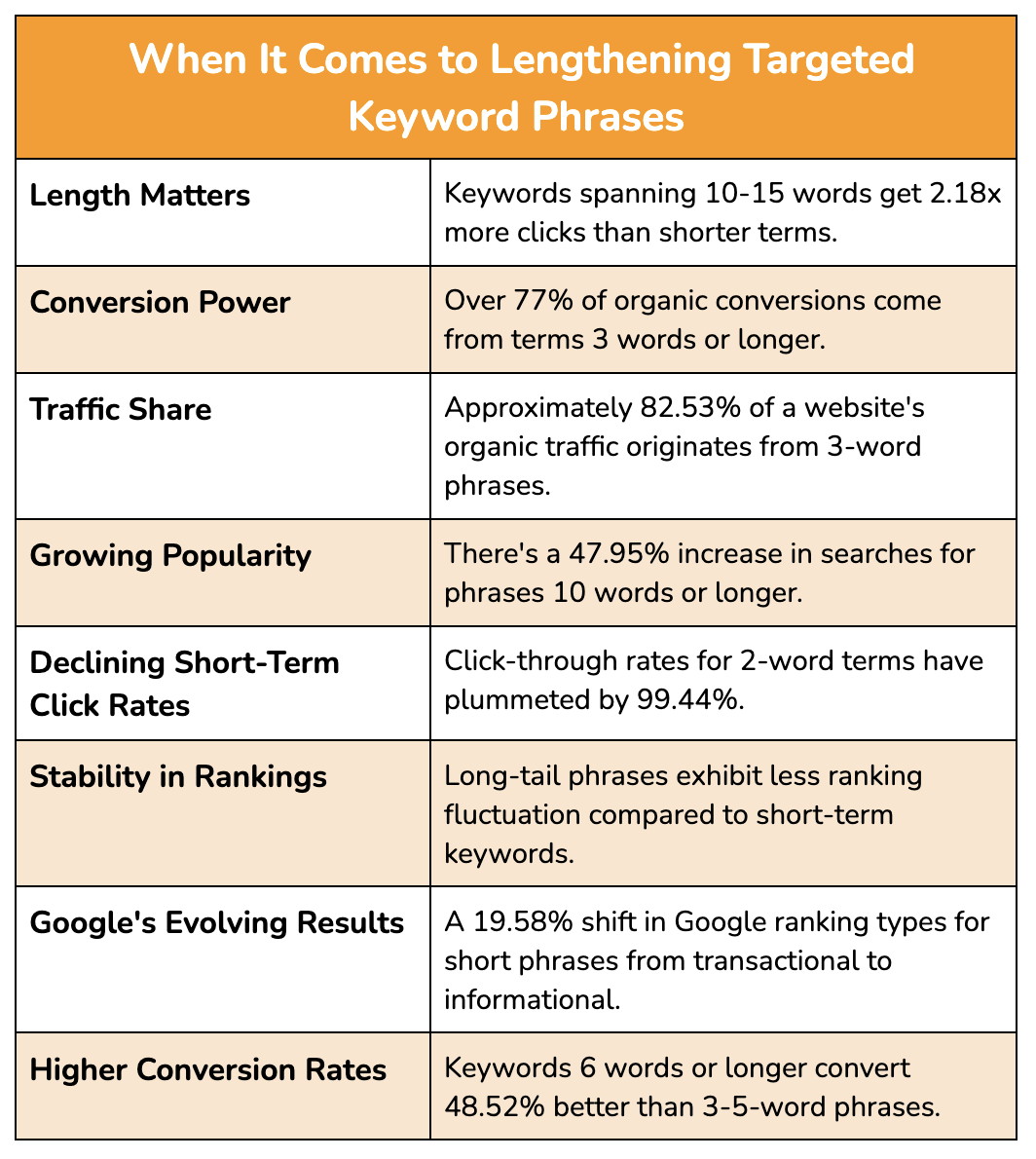SEO is getting tougher, and it’s forcing marketers to find even more clever ways to build relevancy and presence in an online space flooded with AI-generated content. To that end, we’re noticing distinct patterns surrounding SEO keyword strategy as we enter 2024 — and one of them is the growing importance of long-tail keywords.
In this article, we’ll walk you through exactly why long tail keywords are important for SEO success.
Single Grain enables us to increase our impact without increasing our headcount
Why Long Tail Keywords?
Long-tail keywords are phrases typically longer than three words, more specific, and less competitive than generic keywords. Recent analyses by Neil Patel on why long-tail keywords are important for SEO:
What kind of keywords should you really be targeting with your SEO?
We decided to look at our database of 7.4 billion keywords and match it up to analytical data we have on over 1 million plus websites, to figure out what type of keywords are the best.
Because there are head…
— Neil Patel (@neilpatel) December 28, 2023
Using tools like UberSuggest and Answer the Public, this analysis revealed some powerful truths about the digital climate that SEOs are facing when it comes to lengthening their targeted keyword phrases:

How Long Tail Keywords Are Gaining Traction
1) Enhanced User Intent Matching
Long-tail keywords excel in aligning with specific user intents, which significantly improves the chances of matching a searcher’s exact needs. This precision not only increases relevance but also leads to significantly higher conversion rates.

For example, a user searching for “best lightweight waterproof hiking boots for women” is likely in the final stages (commercial or transactional) of the buying process, seeking a product that meets very specific criteria. In contrast, a general search for “hiking boots” may indicate that the user is still in the information-gathering phase (informational).
Think of it this way: When content creators and marketers focus on long-tail keywords, they will inevitably hone in on highly focused content that speaks directly to the user’s stage in the buyer’s journey, increasing the likelihood of engagement and conversion.
When you niche down the topics you write about, people will get more value from it since you took the time to delve deeper into a subject.
2) Less Competitive, More Opportunity
Long-tail keywords, being less common and highly specific, inherently face less competition. Although the search volume might be less than you’d like, the reduced competition is helpful for websites, particularly for niche markets or specialized topics, as it offers a higher chance of ranking on search engines.

For instance, a small business specializing in handmade, eco-friendly pet toys could target long tail keywords like “handmade organic dog toys for large breeds,” which likely have lower competition than broader terms like “dog toys.” This strategy allows smaller or more focused businesses to compete effectively against larger competitors, carving out a significant presence in specific niches.
In essence, long-tail keywords level the playing field, providing opportunities for targeted visibility amongst all the hustle to rank for a few terms that most users are searching for.
Instead of chasing those few, highly-searched terms, brands will likely find more luck pursuing a wider range of more niche terms.
These niche terms, on their own, might carry a small amount of search traffic, but when all combined, will drive the volume to make up for the really competitive broader terms.
3) Changing Search Patterns
With how much voice search technology and conversational AI platforms like ChatGPT has adjusted otherwise normal search patterns, users are adopting a more conversational tone in their queries, asking longer, more detailed questions as they would in natural speech.
The use of voice technology like digital voice assistants is also steadily increasing from year to year, which is no surprise when we factor AI into the equation:

This shift in behavior ultimately points toward long-tail keywords, as they often mirror the structure of these conversational queries.
For example, a voice search query might be “What are the best energy-efficient home appliances for a small apartment?” which is much more specific and detailed compared to a traditional search like “energy-efficient appliances.”
As search technology continues to get more refined and become more integrated into everyday life, the importance of optimizing for long-tail, conversational queries will only ramp up, making them a crucial element of modern SEO strategies.
4) Focus on Quality Traffic, Not Just Quantity
It’s crucial to focus on traffic that leads to conversions. While high-traffic keywords are attractive, they often don’t translate to tangible business outcomes.
Long-tail keywords, although attracting fewer searches, bring in more qualified and conversion-ready visitors.
For example, a website featuring specialized photography equipment will benefit more from targeting long-tail keywords like “best mirrorless cameras for wildlife photography” rather than a high-traffic, generic term like “cameras.” This approach supports the logic that traffic driven to the website may be fewer and farther between, but is highly relevant, qualified users that are more likely to convert into a sale or complete a desired action.
In the end, long-tail keywords offer a more sustainable and effective approach to driving meaningful traffic that aligns with your business goals.
Our Current Approach to Long Tail Keywords
Alright, it’s time we put our money where our mouth is. Below is the general structure we follow as to why long-tail keywords are important for SEO:
- Content Tailoring: Develop content that specifically addresses long-tail queries. For example, a blog post titled “How to Optimize Your CTR for Different Search Intents” targets a specific audience more effectively than a generic “Search Intents” post.
- Understanding User Needs: Analyzing search trends and user behavior helps in crafting content that resonates with the audience’s specific needs and questions. Tools like Google Analytics and keyword planners are invaluable for this purpose.
- Balancing Keyword Strategy: While focusing on long-tail keywords, it’s crucial not to ignore broader terms. A balanced approach ensures coverage across various stages of the customer journey.
- Technical Optimization: Ensure that your website is technically optimized for SEO. This includes aspects like site speed, mobile-friendliness, and structured data, which help search engines understand and rank content effectively.
Final Thoughts on Why Long Tail Keywords Are Important for SEO
The importance of long-tail keywords in SEO is undeniable. We simply can’t ignore it as a viable alternative to highly competitive industry terms that everyone is gunning for. Long-tail keywords offer targeted traffic, higher conversion rates, and less competition, albeit lower search volume. But that’s what we have to learn to let go of — the fixation on chasing search volume over search quality.
As search engines and user behaviors evolve, adapting keyword strategies to include more specific, long-tail phrases becomes not just beneficial, but essential for SEO success.
From my perspective, incorporating long-tail keywords into your SEO strategy will move the needle, leading to improved rankings, more qualified traffic and, ultimately, better conversion rates.
If you’re ready to drive measurable increases in organic traffic with strategic optimization, Single Grain’s SEO experts can help!👇
For more insights and lessons about marketing, check out our Marketing School podcast on YouTube.



